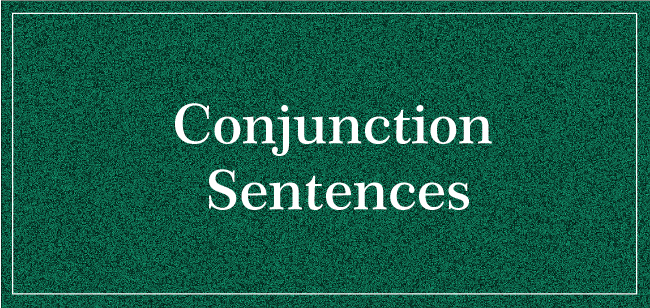Conjunction Sentences
A conjunction refers to the terms that links two or more terms, phrases, clauses, or statements. Conjunctions refer to the invariable grammar portions that might or might not occur in between the components they conjoin.

Types of Conjunctions
Conjunctions occur in variety of kinds or forms and perform various functions within the statements and its parts. These are some examples:
- Subordinating conjunctions - This type of conjunctions, are known as the subordinators, and link/ correlate the dependent clauses to independent ones.
- Coordinating conjunctions - These are also known as coordinators, coordinate or combine/join two or more sentences, primary clauses, terms, or various other pieces of speech which have the same syntactic value/importance.
- Correlative conjunctions - This type of conjunction acts in groups or pairing to link the phrase or terms of comparable significance within a statement.
List of Conjunctions
Although there are only some usual or typical conjunctions, these words serve several functions: They provide explanation, insights, exceptions, outcomes, and contrasts.
Here is a list of common conjunctions.
| And |
Yet |
So |
Since |
Although |
| As |
Whether |
Both/and |
Before |
Whereas |
| Because |
Not only |
Either/or |
How |
Therefore |
| But |
Just as |
Neither/nor |
Where |
Besides |
| For |
Nor |
Whether/or |
When |
Unless |
| Or |
Neither |
Than |
After |
If |
Rules of Conjunction
There are some vital rules to follow while employing conjunctions in the sentences. Make sure to follow the rules, and you will see that your writing will become clearer and crisper.
- Conjunctions are used to link the noun, sentence(s), and other parts of speech as well as ideas, notions, and concepts. For instance, Jessica went to the fruit shop and bought some oranges.
- Conjunctions can be employed for creating the lists. For instance, we made crepes, omelets, and cappuccino for lunch.
- When using conjunctions, ensure that all the elements of the statements sync/accord. For instance, "I work quickly but carefully" shows the agreement.
Using a Conjunction to Begin a Sentence
Most of us were educated in schools that starting a statement with a conjunction is incorrect, but this is a myth. Moreover, if the dependent clause appears well before the independent clause, subordinating conjunction can be used to start a sentence. It is also acceptable to start a statement with a coordinating conjunction. It's often a wonderful approach to emphasize something. However, starting too many sentences with conjunctions will lead the technique to lose its impact, so employ this method sparingly.
Example: Have a safe journey. And remember to call once you get home. Betty shut the door. But there was nothing on the opposite side.
Conjunction Sentences
Since now you know the conjunctions, let us have a look at a few conjunction sentences.The conjunctions in the following instances are highlighted for easy identification:
- I attempted to punch the nail but whacked my finger instead.
- I have two puppies and a fish.
- I'd like a motorcycle for traveling to work.
- You can have fruit, frozen yogurt, or a chocolate sundae.
- Neither the white dress nor the blue one flatters me.
- My father always worked very hard so we could afford the luxuries we desired.
- I work really hard in class, yet I am not scoring excellent marks.
- She prefers to cook at home because she enjoys cooking.
- Although he speaks infrequently, he says important words.
- She is quite amusing, whereas he is extremely boring.
- I'm starving, but the refrigerator is barren.
- Helen speaks 3 languages besides Mandarin.
- John is totally unlike his dad.
- She arrived first. Therefore, she earned a positive seat.
- They can hear music, provided they don't bother anyone.
- You are not required to go unless you like to.
- I stayed up until twelve o'clock, waiting for her.
- Mary was listening to radio when John came in the room.
- You are always free to visit whenever you want.
- She ate in the restaurant, where there was a chair.
- She is quite amusing, whereas he is incredibly boring.
- They are ready to visit you wherever you want.
- Although she is an excellent creative person, she struggles to compose academic articles.
- John is having difficulty in his math lesson, so he hired a teacher.
- Now go home and prepare some meat dishes.
- Once I begin to eat, I must continue.
- I will go to the movies, provided everyone else goes.
- Since I was unwell for 30 days, I quit my job.
- Helen was too late, so she could not apply for the position.
- Supposing you had a kitten, what would you feed it ?
- She is faster than I am.
Now that you understand the many forms of conjunctions and how to apply them.
You can not only detect English conjunction in a sentence but also use it to construct your own sentences.
Conjunctions do not always have straightforward, simple definitions. Instead, they have guidelines for when and how to utilize them. So, the easiest way to learn is to practice employing them appropriately in sentences. Then keep practicing, practicing, practicing, and practicing some more.
|

 For Videos Join Our Youtube Channel: Join Now
For Videos Join Our Youtube Channel: Join Now










